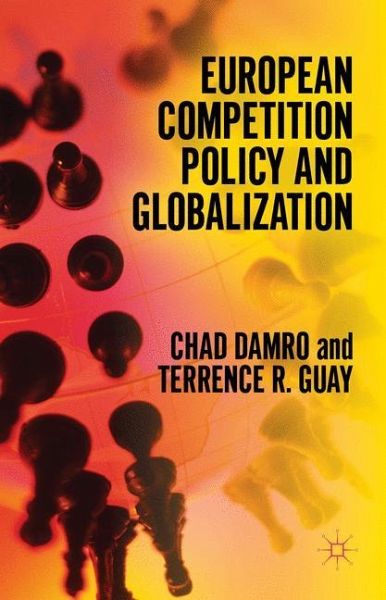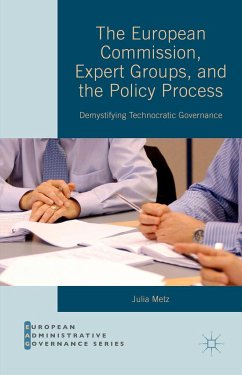
European Competition Policy and Globalization
Versandkostenfrei!
Versandfertig in 6-10 Tagen
Weitere Ausgaben:

PAYBACK Punkte
19 °P sammeln!





This book argues that important changes in European Union competition policy are having profound effects on the global political economy, and these changes are best understood through a two-level game framework as European Commission responses to new domestic and international pressures from various public and private actors.
Chad Damro is Senior Lecturer of Politics and International Relations and Co-Director of the Europa Institute at the University of Edinburgh, UK, where he teaches honours and post-graduate courses on EU external relations. His research focuses on international and domestic sources of International Relations and the interaction of material, institutional and ideational factors in EU external relations. Terrence R. Guay is Clinical Professor of International Business at the Smeal College of Business at Pennsylvania State University, USA, where he teaches undergraduate and MBA international business courses. His research focuses on the competition between governments, international organizations, NGOs, and other non-state actors to shape business behavior and the international business environment, with an emphasis on Europe.
Produktdetails
- Palgrave Studies in European Union Politics
- Verlag: Palgrave Macmillan / Palgrave Macmillan UK / Springer Palgrave Macmillan
- Artikelnr. des Verlages: 978-0-230-29387-8
- 1st edition 2016
- Seitenzahl: 160
- Erscheinungstermin: 29. Februar 2016
- Englisch
- Abmessung: 222mm x 145mm x 14mm
- Gewicht: 297g
- ISBN-13: 9780230293878
- ISBN-10: 0230293875
- Artikelnr.: 44025930
Herstellerkennzeichnung
Springer-Verlag GmbH
Tiergartenstr. 17
69121 Heidelberg
ProductSafety@springernature.com
Review of Revised Proposal
After a careful comparison of the two versions (thanks to MS words) and a re-reading of my previous comments, my impression is that the proposal has been significantly improved. This holds in particular with respect to the focus (e.g. a more limited set of questions at the outset - although the original questions reappear in the introduction; a stronger focus on the European Commission). This focus on the EU Commission serves as the central theme throughout the chapters. It is most of the time convincing (the least perhaps in chapter 2) and promises to provide some intriguing insights not only into the dynamics of the EU Commission's role in global competition policies, but also into the institutional
After a careful comparison of the two versions (thanks to MS words) and a re-reading of my previous comments, my impression is that the proposal has been significantly improved. This holds in particular with respect to the focus (e.g. a more limited set of questions at the outset - although the original questions reappear in the introduction; a stronger focus on the European Commission). This focus on the EU Commission serves as the central theme throughout the chapters. It is most of the time convincing (the least perhaps in chapter 2) and promises to provide some intriguing insights not only into the dynamics of the EU Commission's role in global competition policies, but also into the institutional
Mehr anzeigen
dynamics of the EU.
To my reading, the idea of chapter 6 has been clearly improved, while I still have some the chapter 2. It is true that some of the considerations may be informative to the less familiar reader (point 1), I do not yet understand point 2 ("races") and rather see point three as the natural line of continuation. Point 4 then takes the reader to the core theme. Here, the authors might want to think about merging chapter 1 and 2:
· The considerations about globalization might be the starting point telling the story about globalization, the strategies of firms and the affectedness and reactions of governments
· it might then be an idea to turn to the issue of competition policy with both a general economic and a more specific part (relating to the issue of globalization)
· then Europe, the history of European competition policy and the European Commission might move to the center according to the structure suggested in the proposal.
The idea of my suggestion is to improve the first two chapters that to my reading are the weakest parts of the proposal and to reduce the danger of redundancies between chapter 1 and 1, 2 and 3.
This said, I would like to reaffirm the impression that this is promises to become a very good book. I recommend it for publication.
To my reading, the idea of chapter 6 has been clearly improved, while I still have some the chapter 2. It is true that some of the considerations may be informative to the less familiar reader (point 1), I do not yet understand point 2 ("races") and rather see point three as the natural line of continuation. Point 4 then takes the reader to the core theme. Here, the authors might want to think about merging chapter 1 and 2:
· The considerations about globalization might be the starting point telling the story about globalization, the strategies of firms and the affectedness and reactions of governments
· it might then be an idea to turn to the issue of competition policy with both a general economic and a more specific part (relating to the issue of globalization)
· then Europe, the history of European competition policy and the European Commission might move to the center according to the structure suggested in the proposal.
The idea of my suggestion is to improve the first two chapters that to my reading are the weakest parts of the proposal and to reduce the danger of redundancies between chapter 1 and 1, 2 and 3.
This said, I would like to reaffirm the impression that this is promises to become a very good book. I recommend it for publication.
Schließen
Für dieses Produkt wurde noch keine Bewertung abgegeben. Wir würden uns sehr freuen, wenn du die erste Bewertung schreibst!
Eine Bewertung schreiben
Eine Bewertung schreiben
Andere Kunden interessierten sich für











